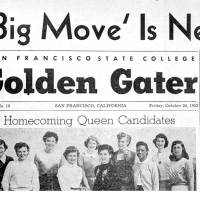SF State Journalism announces role as local monitor for SF city advertising plan

The San Francisco State University Department of Journalism today announces its role as independent local monitor for a plan from the City of San Francisco to invest in ethnic and community media by prioritizing the awarding of print and digital advertising contracts to local independent news publishers.
The new advertising plan was announced today by the City and County of San Francisco. The plan emerges from a report prepared by the Budget and Legislative Analyst Office, at the direction of Supervisor Matt Dorsey, which found that the City and County of San Francisco advertises in just seven of 98 local and ethnic media outlets identified.
In its role, SF State Journalism, under its Collaborative to Improve and Integrate Journalism (CIIJ), would work with ethnic media and community publishers to build capacity for print, digital, and social advertising through existing or emergent channels. A training component would be developed to help publishers establish and maintain status as city vendors, as well as maximize opportunities for revenue through streamlined digital operations and optimized social strategies.
California Common Cause and the Bay Area Independent Community Media Coalition are working together to support recommendations from the city report, including taking steps to ensure efficiency and streamline advertising spending with the city, implement reporting requirements, and develop a directory of community-specific media outlets. SF State Journalism is working alongside these two organizations to emphasize the value of local media and direct resources toward publishers who need it most.
“Funding ethnic and community media helps strengthen communities and create opportunity for SF State Journalism alumni and students,” said Jesse Garnier, chair and associate professor of Journalism at San Francisco State University. “Community members rely on known, local sources for news they can trust, and nobody works harder to build and maintain trust than ethnic and community publishers. Ethnic media, including bilingual, multilingual, and hyperlocal publishers, have been key parts of our communities for decades. This work helps small, community publishers have resources to survive, thrive and continue to inform the public.”
“The vitality of local news makes every San Francisco resident a smarter, more engaged voter. Funding it should be front and center for every city,” said Lydia Chavez, founder and executive editor at Mission Local, an independent nonprofit news site based in San Francisco’s Mission District and member of the Bay Area Independent Community Media Coalition. “We've seen some success in New York from a similar funding model, and we're hopeful that San Francisco's program can even give local news budgets like ours a strong, sustainable source of funding.”
Lisa Rudman, development director at San Francisco Public Press, also a member of the coalition, said, “we see the proposed creation of a liaison and a local directory as positive developments to ensure a portion of the city’s advertising and outreach expenditures are directed to the locally owned community and ethnic media that provide a vital public service to our city.”
“A weak local and ethnic media ecosystem impacts our democracy and harms communities, leading to more corruption, less citizen participation, more misinformation, and even more alienation,” said Maya Chupkov, media & democracy program manager at California Common Cause. “I am happy to see San Francisco recognize the importance of strengthening its local news ecosystem. In many cases, community-specific media have built up the trust of their communities by covering issues often missed by larger media. Having government departments in San Francisco seriously consider a broad range of local and hyperlocal news publications for their advertising could strengthen such outlets—and, by sustaining local news, also support democracy.”
SF State Journalism is the only four-year, accredited journalism program in the City of San Francisco. Established in 1963, SF State Journalism confers Bachelor of Arts undergraduate degrees in Print/Online Journalism, Photojournalism, and, since 2022, Bilingual Spanish Journalism. Currently, 171 undergraduate students (49.1% Latinx, 23.9% white, 8.2% mixed race, 7.6% Asian, 6.4% Black) study under nine full-time faculty to complete curriculum including an unique 12-unit equity core, a 15-unit skills core including short- and long-form writing, video and audio journalism, and a suite of optional electives from community media, to data journalism, to media entrepreneurship and more.
Tags


